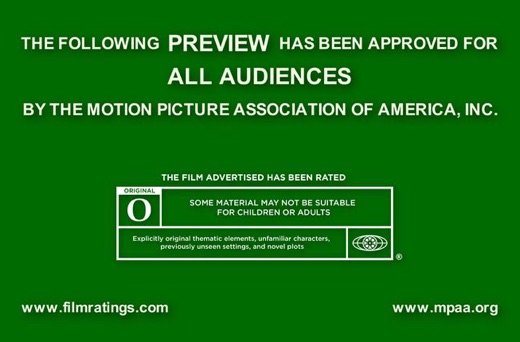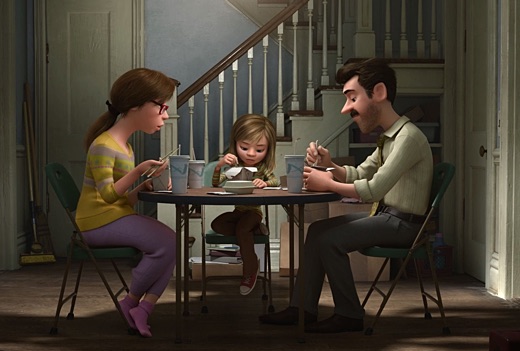SUBHEAD: MPAA adds category "O" for "Original" to warn audiences of films not based on existing works.
By Staff on 20 October 2015 for The Onion -
(http://www.theonion.com/article/mpaa-adds-new-rating-warn-audiences-films-not-base-51651)

Image above: Screen presentation of the new "Original" category rating is not meant as censorship. From original article.
In an effort to provide moviegoers with the information they need to determine which films are appropriate for them to see, the Motion Picture Association of America (MPAA) announced Tuesday the addition of a new rating to alert audiences of movies that are not based on existing works.
According to MPAA officials, the new “O,” or “Original,” designation will inform viewers that a particular film contains characters with whom they are unfamiliar, previously unseen settings, and novel plots.
The rating will also reportedly serve as a warning of the potentially disorienting effects associated with having to remember characters’ names for as many as two hours and the discomfort that can occur when one is forced to keep track of narrative arcs for an entire film.
“We recognize how distressing it can be when viewers go into a film and suddenly find themselves confronted with jarring scenes containing a protagonist they’ve never encountered before, which is precisely why we created this rating,” said Joan Graves, head of the MPAA’s ratings board, who said the new category was added in part due to the thousands of complaints the organization has received from moviegoers who were upset they weren’t given advance notice that they’d have to make sense of the scenarios unfolding onscreen.
“It’s important that today’s movie fans are aware upon entering the theater that none of what they will see has been adapted from a well-known comic book, television series, novel, video game, historical event, previous movie, or theme park ride.”
“Ultimately, it will be up to the consumer’s discretion as to whether a film is suitable for themselves and their family, but the O rating will explicitly caution people that they will have to pay attention during the movie and follow the storyline on their own,” Graves added.
Though sources said films requiring the new rating are comparatively rare, a spate of high-profile movies over the past several years that do not stem from any previously existing source material—including The Kids Are All Right, Her, WALL-E, Birdman, and Nebraska, among others—have left many viewers angered and perplexed.
Citing test audiences they have observed, MPAA officials said that many moviegoers spent the entirety of such films in a state of distress, waiting for the moment when the Incredible Hulk, Katniss Everdeen, Wolverine, or another recognizable character from an established franchise would appear onscreen and clarify the meaning and direction of the film.
“I never would have gone to see Sicario if I knew it was going to be so unbearable,” said filmgoer Mark Kemmer of Cleveland, referring to the recently released crime thriller set against the violent backdrop of the contemporary Mexican drug trade that, under the MPAA’s guidelines, would receive the new rating. “It was pretty much unwatchable.
It seemed like in nearly every scene I had to figure out who the people were and where the story was going. And the whole movie was like that!”
“What a waste of money,” he added.
Others reported being viscerally repulsed by movies they attended that were not based on media that originated several decades or generations earlier, saying they had become so upset by what they had seen that they had trouble even sitting through the films.

Image above: Still from Pixar animation "Inside Out". From (http://www.theverge.com/2015/6/17/8790177/inside-out-movie-interview-pixar-pete-docter-jonas-rivera).
“How does this trash even get made?” said Katherine Hubbard, a mother of three from Rockford, IL, who, after buying tickets for the Pixar film Inside Out, was incensed that her children had been exposed to original storytelling. “Within the first minute, some little girl character my kids have never seen or heard of walks onscreen, and then we immediately have to learn her whole backstory and how she navigates the world?
I marched us all right out of that theater after about 10 minutes.”
While audiences have reportedly been receptive to the new rating, directors and distributors have already decried it as severely damaging in regard to box-office revenues and the number of venues that will carry their films. However, the MPAA was adamant that the new classification should not be interpreted as censorship.
“The O rating isn’t meant to be a punishment or a moral judgment of any kind,” Graves said. “It’s simply a value-neutral designation intended to protect consumers, ensuring that they are fully informed about a movie and are able to make their own decisions about how much artistic and narrative originality they are comfortable seeing.”
“If filmmakers want to avoid the rating and appeal to a wider audience, all they have to do is throw in a superhero or a hobbit or some other licensed property,” Graves added.
.
By Staff on 20 October 2015 for The Onion -
(http://www.theonion.com/article/mpaa-adds-new-rating-warn-audiences-films-not-base-51651)

Image above: Screen presentation of the new "Original" category rating is not meant as censorship. From original article.
In an effort to provide moviegoers with the information they need to determine which films are appropriate for them to see, the Motion Picture Association of America (MPAA) announced Tuesday the addition of a new rating to alert audiences of movies that are not based on existing works.
According to MPAA officials, the new “O,” or “Original,” designation will inform viewers that a particular film contains characters with whom they are unfamiliar, previously unseen settings, and novel plots.
The rating will also reportedly serve as a warning of the potentially disorienting effects associated with having to remember characters’ names for as many as two hours and the discomfort that can occur when one is forced to keep track of narrative arcs for an entire film.
“We recognize how distressing it can be when viewers go into a film and suddenly find themselves confronted with jarring scenes containing a protagonist they’ve never encountered before, which is precisely why we created this rating,” said Joan Graves, head of the MPAA’s ratings board, who said the new category was added in part due to the thousands of complaints the organization has received from moviegoers who were upset they weren’t given advance notice that they’d have to make sense of the scenarios unfolding onscreen.
“It’s important that today’s movie fans are aware upon entering the theater that none of what they will see has been adapted from a well-known comic book, television series, novel, video game, historical event, previous movie, or theme park ride.”
“Ultimately, it will be up to the consumer’s discretion as to whether a film is suitable for themselves and their family, but the O rating will explicitly caution people that they will have to pay attention during the movie and follow the storyline on their own,” Graves added.
Though sources said films requiring the new rating are comparatively rare, a spate of high-profile movies over the past several years that do not stem from any previously existing source material—including The Kids Are All Right, Her, WALL-E, Birdman, and Nebraska, among others—have left many viewers angered and perplexed.
Citing test audiences they have observed, MPAA officials said that many moviegoers spent the entirety of such films in a state of distress, waiting for the moment when the Incredible Hulk, Katniss Everdeen, Wolverine, or another recognizable character from an established franchise would appear onscreen and clarify the meaning and direction of the film.
“I never would have gone to see Sicario if I knew it was going to be so unbearable,” said filmgoer Mark Kemmer of Cleveland, referring to the recently released crime thriller set against the violent backdrop of the contemporary Mexican drug trade that, under the MPAA’s guidelines, would receive the new rating. “It was pretty much unwatchable.
It seemed like in nearly every scene I had to figure out who the people were and where the story was going. And the whole movie was like that!”
“What a waste of money,” he added.
Others reported being viscerally repulsed by movies they attended that were not based on media that originated several decades or generations earlier, saying they had become so upset by what they had seen that they had trouble even sitting through the films.

Image above: Still from Pixar animation "Inside Out". From (http://www.theverge.com/2015/6/17/8790177/inside-out-movie-interview-pixar-pete-docter-jonas-rivera).
“How does this trash even get made?” said Katherine Hubbard, a mother of three from Rockford, IL, who, after buying tickets for the Pixar film Inside Out, was incensed that her children had been exposed to original storytelling. “Within the first minute, some little girl character my kids have never seen or heard of walks onscreen, and then we immediately have to learn her whole backstory and how she navigates the world?
I marched us all right out of that theater after about 10 minutes.”
While audiences have reportedly been receptive to the new rating, directors and distributors have already decried it as severely damaging in regard to box-office revenues and the number of venues that will carry their films. However, the MPAA was adamant that the new classification should not be interpreted as censorship.
“The O rating isn’t meant to be a punishment or a moral judgment of any kind,” Graves said. “It’s simply a value-neutral designation intended to protect consumers, ensuring that they are fully informed about a movie and are able to make their own decisions about how much artistic and narrative originality they are comfortable seeing.”
“If filmmakers want to avoid the rating and appeal to a wider audience, all they have to do is throw in a superhero or a hobbit or some other licensed property,” Graves added.
.
No comments :
Post a Comment